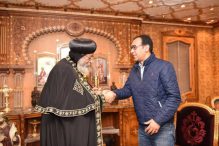Category: EGYPT
-

On Cue With Elon Musk, A Solar Power Company Blooms In The Egyptian Desert
CAIRO—About a half-million solar panels were installed every day around the world last year, according to the International Energy Agency. Costs for solar photovoltaics are expected to drop by 25% by 2020, making solar — already competitive — cheaper than other forms of energy in many cases. Smart entrepreneurs will get ahead of that curve.…
-

Critical film unnerves Egypt’s religious scholars
Egypt’s religious scholars are up in arms over a new film that takes on the nation’s sheikhs and mosque preachers. The film, called “Mawlana” (“Preacher”), has been screened at cinemas nationwide since Jan. 4. It has stirred up controversy among Islamic scholars who accuse its makers of tarnishing their reputation and call for it to…
-

Egyptian Omar Samra Becomes First in the World to Climb Three Mountains in Antarctica
Egyptian adventure icon and mountaineer Omar Samra fulfilled a personal dream of his after climbing three mountains in Antarctica that had never before been ascended. “It has always been a dream of mine to climb a mountain that has never been climbed before. And doing so in remote Antarctica was an even greater privilege,” wrote…
-

How ‘Careem’ Hopes to Unite Egyptians After Cairo Cathedral Terror Attack
As a wave of sorrow and despair overtook the nation last week after a bomb was set off inside the St. Mark’s Cathedral in Cairo, many were wondering how they can help. Unfortunately, many of these thoughts were ultimately ephemeral. However, for Wael Fakharany, Managing Director of the car service application Careem, the thought of helping…
